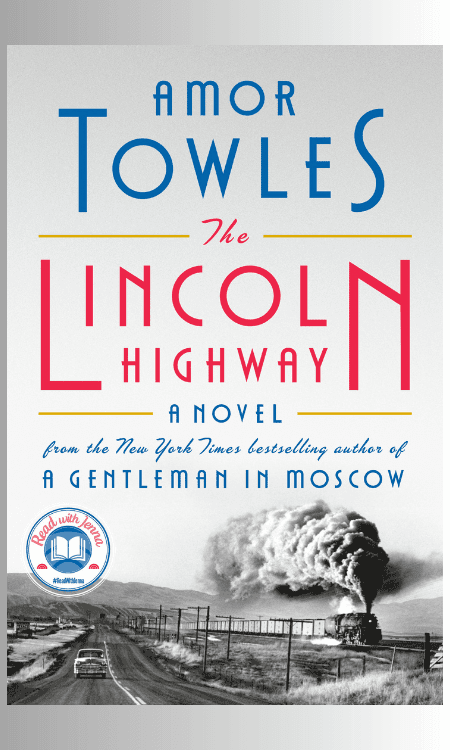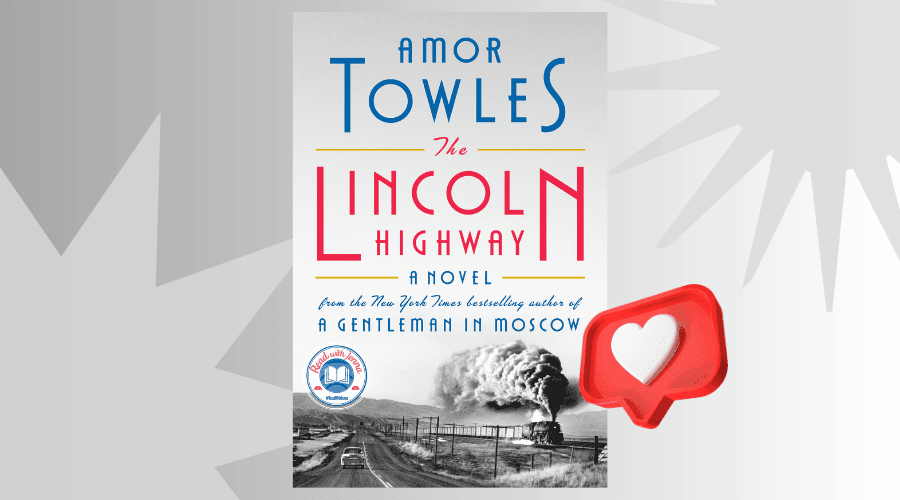Lincoln Highway, by Amor Towles, is a novel about coming of age, non-put-down-able, set in the year 1954. It follows an 18-year-old Emmett Watson, now released from a juvenile work camp, intending to start afresh with his younger brother, Billy. Their goal is to head west, but unexpected detours arise when two of Emmett’s former bunkmates show up with their own schemes, leading the brothers on an unexpected journey across the country. With richly drawn characters and a poignant exploration of friendship, resilience, and the pursuit of dreams, this epic road trip is as heartfelt as it is adventurous.

| Author | Amor Towles |
| Publication date | October 5, 2021 |
| Goodreads Rating | 4,23 |
| Page count | 576 pages |
| Genres | Fiction, Historical Fiction, Historical, Literary Fiction, Adventure, Coming Of Age, Adult, Novels |
The Lincoln Highway Summary
The novel begins in June 1954, where 18-year-old Emmett Watson is let out early from a juvenile detention center in Kansas for accidentally killing a boy in a fight. He goes back to his family’s foreclosed farm in rural Nebraska, only to find his father having died recently and leaving him with loads of debt. He lives literally without home or family, except for his 8-year-old brother Billy, and Emmett decides to leave Nebraska to head west for a clean start. He plans to make his way down to Texas or California, rebuild his life as a carpenter, and give Billy that stable future their father never could.
Billy is imaginative and adventurous, and he suggests a plan: to head west on the Lincoln Highway, a route taken by early cross-country travelers, in hopes of locating their mother, who had left them many years ago. Billy brings with him his beloved book about heroes and adventurers, guiding his actions throughout their journey.
However, their plans are quickly disrupted by two of Emmett’s former bunkmates from juvenile detention, Duchess and Woolly, showing up uninvited. Charming but imbalanced schemer Duchess and sweet-faced, messed-up rich kid Woolly bring their own agenda: they want Emmett to accompany them on a voyage to upstate New York, where Woolly has a hidden family stash. Manipulator Duchess convinces Emmett to join them, and the group is now set on an unexpected road trip east instead of west.
The story is told through multiple perspectives as the voyage reveals the hopes, dreams, and flaws in each character. Emmett remains set on keeping his path straight-and-narrow for Billy’s sake but finds his resolve constantly tested by Duchess, who seems hell-bent on surprise. Billy is the moral compass of the group, his innocence and idealism shining through in the most uncomfortable situations. Duchess is troubled by a difficult relationship with his father and views the journey as an opportunity for a kind of justice of his own. Woolly, entangled by the expectations of his family and personal struggles, dreams of freedom and simplicity.
It’s a road trip heavy with detours, mishaps, and encounters with colorful characters-all with something to add to the quest of morality, loyalty, and redemption that plays throughout the novel. From that wild night in the New York nightclub to the violent confrontation in the railyard, there’s no shortage of action that tugs at bonds and nudges these characters toward their confrontation with their different pasts.
As the story unfolds, the Lincoln Highway itself becomes a metaphor for life’s journey—full of unexpected twists, setbacks, and opportunities for growth. By the novel’s conclusion, each character’s fate is shaped by their choices, offering a poignant meditation on the power of second chances, the weight of responsibility, and the enduring strength of hope.
With its incredible 1950s setting that’s richly detailed, The Lincoln Highway is a sweeping, character-driven novel, movingly capturing in its pages the beauty of human attachment and the timeless seductiveness of the open road.
The Lincoln Highway Ending Explained
The ending of The Lincoln Highway ties up its themes of justice, redemption, and new beginnings while leaving some elements open to interpretation.
Duchess’s Fate
Duchess dies tragically and ironically. After recovering Woolly’s inheritance money, he is left unconscious in a drifting boat by Emmett. Unable to escape due to the weight of the safe, Duchess’s death symbolizes the consequences of his manipulative and reckless actions.
Emmett and Billy’s Journey West
Emmett and Billy finally set off westward, pursuing their original plan of starting fresh. Emmett’s choice to leave Duchess behind signifies his resolve to focus on a hopeful future for himself and Billy, free from the burdens of the past.
Woolly’s Tragic End
Woolly’s suicide highlights the pressures of societal expectations and the emptiness wealth cannot fill. His story underscores the novel’s exploration of mental health, belonging, and loss.
Why did Woolly Kill Himself in The Lincoln Highway?
The suicidal end of Woolly in The Lincoln Highway comes from the very deep feeling of incompleteness, struggles with his mental health, and the inability to fit into the rigid expectations of his privileged family. Kind and soft-skinned, Woolly finds himself unfit in a world where everything must be in terms of conformity and achievement, an exact opposite to the overachiever siblings he possesses. His longing for simplicity and freedom, represented by his fascination with childhood pleasures and the inheritance money, cannot overcome his feelings of isolation and despair. Finally, his death is a tragic comment upon the pressures that societal and family expectations can inflict, and demonstrates how such people can be sadly destroyed by pressures that make them feel they will never fit in.
Themes
The ending emphasizes morality, the consequences of choices, and the potential for renewal. Emmett and Billy’s departure symbolizes hope, while the open-ended conclusion invites readers to imagine their future.
Ultimately, The Lincoln Highway ends on a bittersweet yet hopeful note, reinforcing that life is a journey shaped by choices, relationships, and unforeseen turns.
The Lincoln Highway Review
Amor Towles brings readers another read engagingly penned and elegantly crafted: The Lincoln Highway. A road trip story set in 1954, this is an interesting combination of adventure, some coming-of-age elements, and rich character exploration. Its charm resides in the original storytelling and multidimensional cast, while some parts of the book might be a turn-off for certain readers.
Pros
- Engaging Characters: Every character is well fleshed out with compelling backstories and unique personalities: Emmett, steadfast and determined, provides the contrasting balance to Duchess, a morally ambiguous schemer, and Billy, an innocent and hopeful beacon of light. Woolly adds an air of emotional softness, while the quirks of the supporting cast round out the narrative.
- Unique Structure to the Story: The story is told from various perspectives, which enables the readers to delve into the minds of a few key characters. This method gives more complexity and helps to unwind the motivations and histories driving their actions.
- Lyrical Writing Style: The prose of Towles is lyrical and precise, capturing the nostalgic Americana of the 1950s while exploring timeless themes of morality, redemption, and the pursuit of dreams.
- Thought-Provoking Themes: The novel explores themes such as brotherly complexity, the burden of responsibility, and the creation of a new path. It also looks into questions of justice and personal growth, which leave readers pondering.
- Rich Atmosphere: From the dusty plains of Nebraska to the bustling streets of New York City, the settings are described with vivid detail, immersing readers in the era and landscapes of the story.
Cons
- Pacing Issues: While the novel is well-written, some parts of the journey do feel either stretched or simply deviating into minor details for readers who like to go through a faster narrative. These detours at times overshadow the main plot of the story.
- Unresolved Subplots: There are storylines or character arcs not properly wrapped up or feeling incomplete, leaving the reader desiring more resolution for some secondary characters.
- Word Count: Being more than 500 pages, the novel requires a great deal of time. To some readers, it may be too long or feel like the story could have been told in a shorter way.
- Character Accessibility: The characters are well-structured, but some of their actions, especially those of Duchess, might annoy the readers because his moral ambiguity and decisions can be polarizing.
- Heavy on Reflection: The novel leans heavily on introspection and philosophical musings, which might not please readers who want more action in a story.
Overall Verdict
The Lincoln Highway is variously a gratifying read, full of those now-familiar tropes of literary fiction, character-driven narrative, and historical setting. Above all, Towles shows his mastery in telling a story-a really memorable journey across mid-20th-century America. However, its leisurely pace and philosophical detours will not make it suitable for readers who like fast or tightly plotted reads.
If you loved Towels’ A Gentleman in Moscow or enjoy sprawling, reflective stories like Steinbeck’s East of Eden, this will be your book.

